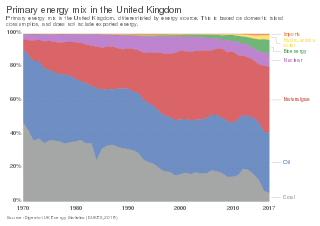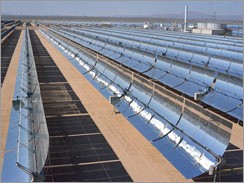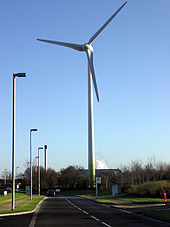
Scottish Power Limited, trading as ScottishPower, is a vertically integrated energy company based in Glasgow, Scotland. It is a subsidiary of Spanish utility firm Iberdrola.
The United Kingdom's Climate Change Programme was launched in November 2000 by the British government in response to its commitment agreed at the 1992 United Nations Conference on Environment and Development (UNCED). The 2000 programme was updated in March 2006 following a review launched in September 2004.
The Renewables Obligation (RO) was designed to encourage generation of electricity from eligible renewable sources in the United Kingdom. It was introduced in April 2002, both in England and Wales and in Scotland albeit in a slightly different form: the Renewables Obligation (Scotland). The RO was later introduced in Northern Ireland in April 2005. In all cases, replacing the Non-Fossil Fuel Obligation which operated from 1990.

The Office of Gas and Electricity Markets (Ofgem), supporting the Gas and Electricity Markets Authority, is the government regulator for the electricity and downstream natural gas markets in Great Britain. It was formed by the merger of the Office of Electricity Regulation (OFFER) and Office of Gas Supply (Ofgas).

Good Energy Group PLC is a British energy company based in Chippenham, Wiltshire that provides services in the electrification of transport and decentralised renewable energy generation such as domestic solar panels. The company is also an energy retailer, and built a portfolio of wind and solar generation which was sold in 2022. Founded by Juliet Davenport, its CEO is Nigel Pocklington.

The energy policy of the United Kingdom refers to the United Kingdom's efforts towards reducing energy intensity, reducing energy poverty, and maintaining energy supply reliability. The United Kingdom has had success in this, though energy intensity remains high. There is an ambitious goal to reduce carbon dioxide emissions in future years, but it is unclear whether the programmes in place are sufficient to achieve this objective. Regarding energy self-sufficiency, UK policy does not address this issue, other than to concede historic energy security is currently ceasing to exist.
Ecotricity is a British energy company based in Stroud, Gloucestershire, England, specialising in selling green energy to consumers that it primarily generates from its 87.2 megawatt wind power portfolio. It is built on the principle of heavily reinvesting its profit in building more of its own green energy generation.
Energy Saving Trust is a British organization devoted to promoting energy efficiency, energy conservation, and the sustainable use of energy, thereby reducing carbon dioxide emissions and helping to prevent man-made climate change. It was founded in the United Kingdom as a government-sponsored initiative in 1992, following the global Earth Summit.
The CRC Energy Efficiency Scheme was a mandatory carbon emissions reduction scheme in the United Kingdom which applied to large energy-intensive organisations in the public and private sectors. It was estimated that the scheme would reduce carbon emissions by 1.2 million tonnes of carbon per year by 2020. In an effort to avoid dangerous climate change, the British Government first committed to cutting UK carbon emissions by 60% by 2050, and in October 2008 increased this commitment to 80%. The scheme has also been credited with driving up demand for energy-efficient goods and services.

Solar power has a small but growing role in electricity production in the United Kingdom.

The Eugene Green Energy Standard was an international standard to which national or international green electricity labelling schemes could be accredited to confirm that they provide genuine environmental benefits. It was designed to encourage the generation and use of additional renewable energy sources for electricity generation, although the limited use of additional natural gas-fired cogeneration plant was also supported. Initially funded in part through the EU's clean-e programme, but also including some participants from outside Europe, the Eugene standard was formally discontinued after February 2009.
Future Energy is a former accreditation scheme for green electricity in the United Kingdom, designed to support and stimulate electricity generation from renewable energy sources. The scheme was launched in 1999 and was operated by the Energy Saving Trust until funding expired in 2002.
A Guarantee of Origin is an energy certificate defined in article 19 of the European Directive 2018/2001/EC. A GO certifies attributes of electricity, gas, heating and cooling, especially coming from renewable sources and provides information to energy customers on the source of their energy. Guarantees of Origin are the only defined instruments evidencing the origin of electricity generated from renewable energy sources.
In the United Kingdom, an electricity supplier is a retailer of electricity. For each supply point the supplier has to pay the various costs of transmission, distribution, meter operation, data collection, tax etc. The supplier then adds in energy costs and the supplier's own charge. Regulation of the charging of customers is covered by the industry regulator Ofgem.

Bullfrog Power, an Envest company, is a Canadian green energy retailer operating in Canada. Bullfrog offers green electricity from renewable energy sources such as wind, solar, and low-impact hydro, as well as green fuel and green natural gas, a renewable biogas product that serves as an alternative to fossil fuel-based natural gas. Bullfrog only sources electricity from generation sources that meet or exceed the federal government's Environmental Choice Program EcoLogo standard for renewable electricity. Bullfrog's green natural gas product is produced at facilities that have met environmental standards as defined by ICF International.

OVO Energy is a major energy supplier based in Bristol, England.

100Green, operating as Green Energy (UK) Ltd, is a British independent-energy company based in Ware, Hertfordshire. It was established in 2001 by CEO Douglas Stewart. The company provides Ofgem-certified renewable electricity and green gas to domestic and business customers throughout Great Britain. It is currently the only energy supplier in the UK to offer 100% green gas.
A feed-in tariff (FIT) is paid by energy suppliers in the United Kingdom if a property or organisation generates their own electricity using technology such as solar panels or wind turbines and feeds any surplus back to the grid. The FIT scheme was imposed on suppliers by the UK government, and applied to installations completed between July 2009 and March 2019.
Zero-carbon housing is housing that does not emit greenhouse gasses (GHGs) into the atmosphere, either directly, or indirectly due to consumption electricity produced using fossil fuels. Most commonly zero-carbon housing is taken to mean zero emissions of carbon dioxide, which is the main climate pollutant from homes, although fugitive methane may also be emitted from natural gas pipes and appliances.

A consumer green energy program is a program that enables households to buy energy from renewable sources. By allowing consumers to purchase renewable energy, it simultaneously diverts the utilization of fossil fuels and promotes the use of renewable energy sources such as solar and wind.










